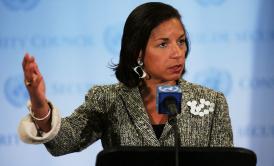The Sunday talk shows saw dueling views of the attack on the American consulate in Benghazi, with Libya’s president insisting the attack was pre-planned, and the U.S. ambassador to the United Nations saying it was “spontaneous.” In an interview with CBS News, President Mohammed Magarief said Libya has made some 50 arrests in connection with the arrests. “It was planned, definitely, it was planned by foreigners, by people who entered the country a few months ago, and they were planning this criminal act since their arrival,” he said. U.N. Ambassador Susan Rice told both CBS and ABC that the protests erupted after the Cairo demonstrations and then extremists joined protesters with heavy weapons.
U.S. Defense Secretary Leon Panetta said that while the protests are likely to continue “over the next few days, if not longer,” he noted that the violence appears to be waning after a relatively calm day Saturday, reports the Associated Press. Still, the Obama administration ordered the evacuation of most U.S. government personnel and their families from Tunisia and Sudan while warning Americans not to travel to those countries, reports the Washington Post.
The decreasing violence doesn’t mean the White House is now relaxing. The Obama administration seems to recognize the days of anti-U.S. violence seen across the Muslim world in recent days is likely the beginning of a long period of turmoil and doubt over Middle East policy, notes the New York Times. Administration officials say the controversy surrounding Mitt Romney’s statement on the attacks helped them avoid some uncomfortable questions that are likely to take center stage during the last stretch of the presidential campaign.
How did widespread anger over a crude and amateurish movie begin? It all started with a phone call on Sept. 4, reports McClatchy. That was when a Coptic Christian who lives in the United States first called a reporter in Egypt and told him to take a look at a film he had helped produce. The reporter reluctantly published a three-paragraph article. Five days later, protesters were storming the U.S. Embassy in Cairo.
